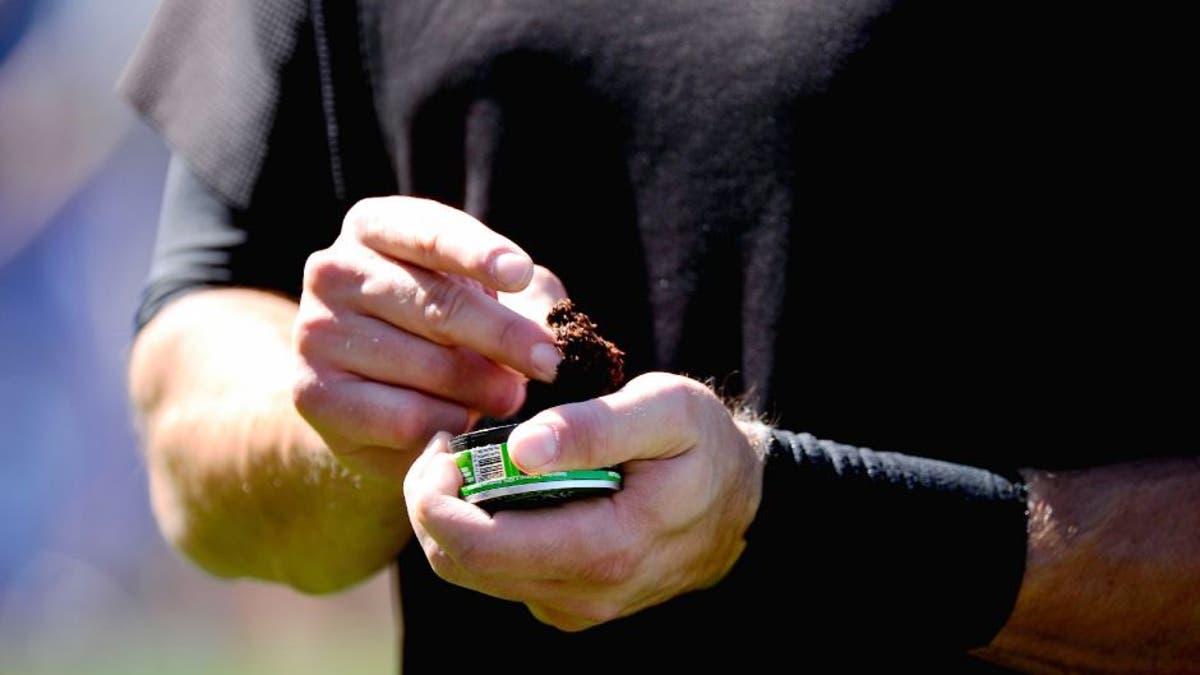
LOS ANGELES, CA - MARCH 31: Pat Burrell #5 of the San Francisco Giants uses smokeless tobacco during warm ups prior to playing the Los Angeles Dodgers on Opening Day at Dodger Stadium on March 31, 2011 in Los Angeles, California. (Photo by Kevork Djansezian/Getty Images) *** Local Caption *** Pat Burrell
The City of Los Angeles recently passed an ordinance to ban smokeless tobacco at all baseball and athletic venues that will directly affect Dodgers players this upcoming season. Similar bans have been passed in Boston and San Francisco, and the New York Times has reported that New York City has also introduced a smokeless tobacco ban bill.
The ban has its roots largely in the premise that baseball players who chew or dip smokeless tobacco influence young fans to do the same.
Smokeless tobacco is awful for your health -- no one debates that -- but it is also not illegal. You can buy smokeless tobacco legally in this country, as long as you are 18 years of age.
I don't dip or chew anymore. I first tried it in high school and chewed some in college and in my professional baseball career. I liked it, but the risk vs. reward didn't add up, so I never did it with any regularity. It was easy for me to say no. That's not the case with a lot of players.
The story for most who chew tobacco or who use dip doesn't start with, "When I was a kid I watched my favorite baseball player use smokeless tobacco so I started using it, too." Like most vices, a peer often introduces smokeless tobacco to us. Then it becomes decision time and hopefully you have prepped your child. Ideally, he says no, but if he says yes, don't blame baseball players.
Major League Baseball does a good job of educating its fans and its players about the perils of smokeless tobacco use. Joe Garagiola would hold a once-a-year mandatory meeting in spring training to educate players and coaches on the health risks of smokeless tobacco. He held no punches. The images were graphic and his message was more than enough to scare me out of using it.
For those who were addicted already, though, it did very little.
MLB and the MLBPA developed a plan in 2015 that made a doctor available, one who is an expert in the field, to help players quit. A comprehensive and confidential treatment plan was developed with the hope that an often-lifelong addiction can become a thing of the past. It is a wonderful option for players and one I am surprised was not available sooner.
The ballpark ban, however, will accomplish very little and it steps on the freedoms of players while hiding behind the idea of protecting our children.
If cities were concerned about protecting the immediate and long-term futures of our children, alcohol would never be served at a professional sporting event.
Consider:
● I've never seen a fight in the stands at a game because one or more of the participants had too much smokeless tobacco.
● Drivers who are over the smokeless tobacco legal limit do not cause deadly automobile accidents.
● My kids have never been made uncomfortable at a game by a fan who is being belligerent and cursing because he has had too much smokeless tobacco.
● No one has gotten cancer because he was subject to someone else's smokeless tobacco use.
● A fan has never died at a stadium because he had too much smokeless tobacco.
It is not the job of professional athletes, leagues or teams to raise your children or teach them right from wrong -- that's your job. Cities banning smokeless tobacco in the name of protecting children rings hollow.
When an athlete does something wrong from a sport my children follow I talk to them about it. That's part of my job as their father.
Baseball and other sports do a good job of using the attention they receive to make fans aware of a variety of issues that need attention. The PSAs, the programs and a player using his voice to raise awareness are of great value, and we all love it when an athlete takes on a cause.
But this isn't that.
Education and awareness are the keys and those have to take place at an early age. Bans don't work. The idea that tobacco use among children is a baseball issue is erroneous. These bans will accomplish nothing to address the problem.
